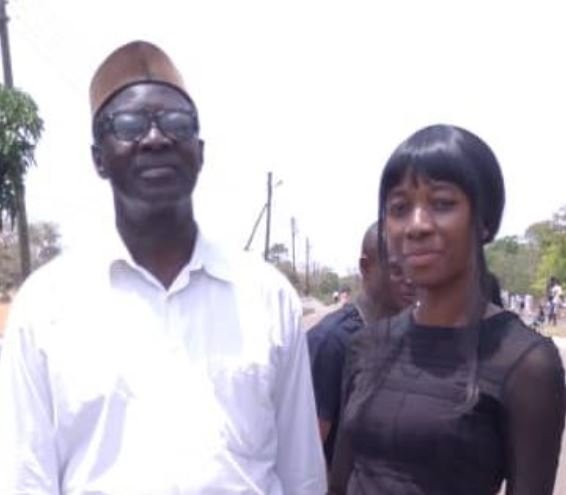News
Govt urged not to neglect dredging of Odaw River

The Member of Parliament (MP) for Klottey Korle Constituency in the Greater Accra Region, Dr Zanetor Agyeman-Rawlings has urged the government to take proactive measures to ameliorate dangers of impending flooding.
She noted that Parliament had approved funds for the dredging and desilting of drains in the country, especially the Odawna River to address predicted effects of floods, but the project remained neglected.
Dr Agyeman-Rawlings made the call when she toured areas affected by recent downpour in her constituency to assess situation first hand and also donated relief items to residents affected by the floods.
While affirming her commitment to the protection of lives and property of the constituents as embedded in her vision for Klottey Korle, she called on the government not to treat floods as perennial problem but an emergency that needed urgent solution and maintained that ” disaster management is multifaceted discipline that touched every aspect of human endeavour hence the need for the government to dredge Odaw River.”
Dr Agyeman-Rawlings, who is a member of Environment, Science and Technology Committee of Parliament, threatened to petition the President as the project had been neglected and people continue to lose their lives and properties anytime it rained, would hold state authorities responsible as obvious neglect of project was unacceptable, lives, livelihoods were being destroyed and was time the government stepped in and took necessary action.
“It is not enough for state agencies that have been legally mandated to oversee needs of people during such disasters to continue to pay lip service as people perish, for government officials to come around every year and say sorry to the people,” she stressed however, assured residents of “my commitment, determination and dedication to your safety as I follow up with appropriate authorities including presidency to ensure Odaw River is dredged for easy flow of rainwater to reduce floods.”
The MP pledged her continual education and sensitisation of residents, public, individual and collective responsibility to ameliorate effects of rains. -peacefmonline.com
News
MoMo vendor 24 murdered at Kwadaso

A disturbing crime has shaken the Kwadaso Onion market community in Kumasi, leaving family and friends grieving the loss of a young life.
Identified only as Junior, a 24-year-old mobile money vendor, was found murdered in his room on Saturday, March 8, 2025.
According to eyewitnesses, Junior had returned home the previous day with a substantial amount of money, over Gh¢20,000.
It was suspected that the killers might have been motivated by the large sum of money in Junior’s possession.
A police source that confirmed this to The Spectator, said investigation has been launched into Junior’s murder, but so far, no arrests have been made.
The Kwadaso community is reeling in shock, calling for justice and an end to the atrocity that has claimed the life of a young and promising individual.
Junior, is believed to be a native of Ejisu Onwe, and was known to his colleagues and friends as a hardworking and diligent individual who worked at the Kumasi Race Course.
His tragic death serves as a stark reminder of the risks and challenges mobile money vendors faced.
The incident comes barely a month after Patricia Nimako, a 27-year-old Mobile Money (MoMo) vendor, was shot and killed at Krofrom, Kumasi in the Ashanti region by an unknown assailants.
The suspected armed robbers fled with the deceased cell phones and an amount of GH¢10,000 on Thursday, February 13, at approximately 3:00 p.m.
The two armed robbers reportedly stormed the kiosk where the deceased was operating and without any provocation shot her dead.
There has not been any arrest yet by the police.
From Kingsley E. Hope , Kumasi
News
Former Dean, 68, in same law class with daughter Wonders, the sages say shall never end.

Some people say life is all about nursing and adding value to it to build and gain an incorporated image in society.
It is also said that age is just a number and must not serve as a barrier to people who seek to pursue their long-cherished dreams by going into new areas to acquire knowledge.
With this in mind, a former Dean of Business, Education and Law at the University for Development Studies, Wa Campus, Professor Daniel Bagah, 68, a foundation layer of UDS and former Upper West Region’s Council of State member has enrolled to venture into the legal field to study law at SDD-UBIDS this academic year.
The surprising thing about Professor Bagah going to read law is not about his age, but that he is sitting at the backline of his third daughter in the same class for lectures to the admiration of the young ones in lecture halls and some of the lecturers he handled at the university.
When Professor Emmanuel K. Derbile, Vice Chancellor of the SDD-UBIDS announced the name of Professor Bagah among the ‘freshers’ for the 2024-2025 academic year to pursue LLB, there was an uproar among the students and some lecturers alike about the news.
Talking to Professor Bagah in an interview, he said the legal field had been his long-cherished dream, which was about to elude me but time has come for him to venture into new areas to acquire new knowledge.
“I believe in getting to new areas of knowledge and throughout my studies, my first, second and third degrees, I have not been able to do law, which is a new area for me. My age is nothing to me, it is my intention to challenge the young lecturers and students to emulate me and go into the legal field to know of their human rights and the rights of other people.
“For the few days that I have been lectured, I have realised that I had trampled on so many people’s rights ignorantly, even during communication with others l wrong them,” he said.
Professor Bagah, therefore, advocated basic law to be taught at all tertiary schools in Ghana to open the mindsets of the students to know about their rights and the rights of others, as well as defend the country patriotically.
He appealed to the people of northern Ghana to take advantage of the Law School to improve their lives since the school is the first law school in the north.
Miss Portia Bagah, 24, said her degree was in Estate Management and her dad had been an inspiration in her life, encouraging her to pursue the law programme.
She said the presence of her father in class serves as motivation and challenge to her and not a setback like others might be thinking. –GNA







